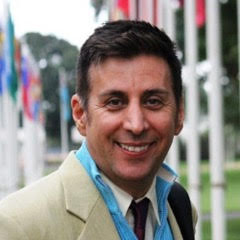 FOR far too long rich Western countries have had the luxury of a plentiful supply of water. Yet water scarcity will become a common occurrence as we experience greater water stress
FOR far too long rich Western countries have had the luxury of a plentiful supply of water. Yet water scarcity will become a common occurrence as we experience greater water stress
This week delegates met at the World Water Forum in Istanbul to discuss what action can be taken to prevent global water scarcity. A combination of climate change, population growth, and increased demand for food, energy and biofuels will mean that by 2030 water will be scarcer than ever before with almost half of the world’s population living in areas of high water stress.
When it comes to water we are most definitely leaving beyond our means. We may extract even greater amounts of water from the surface and groundwater sources. However, this is not a long-term solution.
Water is a crucial element for human existence. It is estimated that each person needs about 20 litres of water each day for the basics – to drink, cook and wash. Everyone has a right to sufficient, safe, acceptable and affordable water for personal and domestic uses. Safe water is necessary to avoid death from dehydration, reduce the risk of water-related disease and provide for cooking, personal and domestic uses.
 Unfortunately, these days fresh, clean water is becoming a precious commodity. Access to basic water-related services (e.g safe drinking water, sanitation and food production) remains inadequate in many developing countries. Especially in Sub-Saharan Africa where about 340 million people lack access to safe drinking water. It is often the poor who suffer the most. The number of people living on less than US$1.25 a day coincides with the number of those without access to safe drinking water.
Unfortunately, these days fresh, clean water is becoming a precious commodity. Access to basic water-related services (e.g safe drinking water, sanitation and food production) remains inadequate in many developing countries. Especially in Sub-Saharan Africa where about 340 million people lack access to safe drinking water. It is often the poor who suffer the most. The number of people living on less than US$1.25 a day coincides with the number of those without access to safe drinking water.
Individuals and companies are all guilty of the wasteful consumption of water. The World Water Development report published this week warns some countries are already reaching the limits of their water resources. Climate change is likely to aggravate this situation even further leading to intense competition for water resources. The Intergovernmental Panel on Climate Change estimates that up to 2 billion people may be at risk from increasing water stress by the 2050s, and that this number could rise to 3.2 billion by the 2080s.
A European Environment Agency report on water resources across Europe shows that southern Europe continues to experience the greatest water scarcity problems. However, water stress is growing in parts of northern Europe. Climate change will further exacerbate water stress due an increase in the severity and frequency of droughts in the future, especially during the summer months.
If we are to avoid water stress than we need to cut demand, minimise the amount of water that we are extracting and increase the efficiency of its use. Good governance is essential for water management as water scarcity becomes an increasingly political issue. While policies exist to improve water management and to reduce water demand and loss these reforms have not had any noticeable effect. The World Water Development report calls for increased investment in water infrastructure by political and business leaders to avoid the risk of economic activity and development goals being undermined. It emphasises the importance of partnerships between governments the private sector and civil society.
The current global economic crisis could provide an opportunity to begin to address the emerging water crisis. However, the future management of water needs to be seen as an urgent and real issue to ensure that stakeholders can engage in addressing the issue.
As pictures are beamed back from Mars of droplets of water on Nasa’s Mars Phoenix Lander providing the first photographic evidence of water existing in its liquid state on the planet, we can only hope we can make the necessary changes to ensure we have more that a few droplets left on this planet.
© Gary Haq 2009

